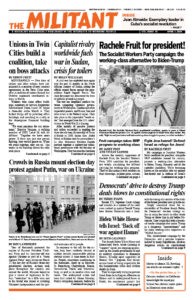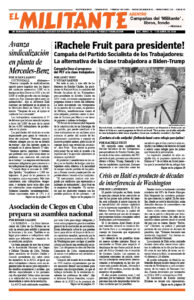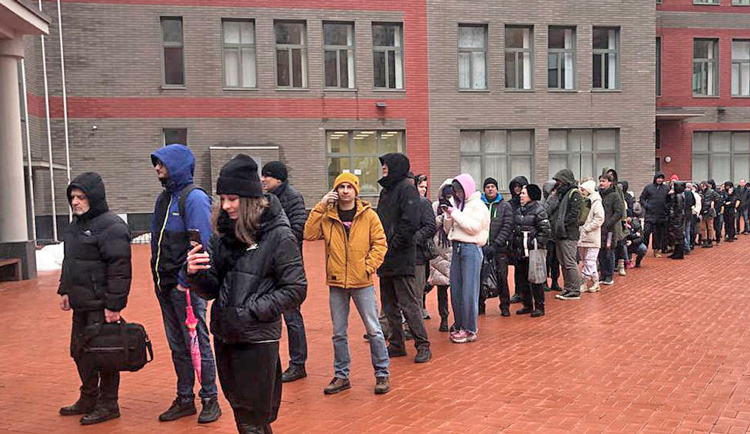Tens of thousands protested the regime of Russian President Vladimir Putin and his two-year-old war against Ukraine as part of a “Noon Against Putin” mass action on March 17, the last day of Russia’s three-day presidential election. Actions took place throughout the country and around the world. Moscow hoped to give a veneer of legitimacy to Putin’s “reelection” to a fifth term and to his brutal war aimed at crushing Ukraine’s independence and the spirited resistance of its people.
In response to the call for the action, long lines suddenly formed at midday outside innumerable polling stations across 11 time zones in Russia. People, sometimes numbering in the thousands, lined up in Moscow, St. Petersburg, Chelyabinsk, Tomsk, Novosibirsk, Omsk and Yekaterinburg, as well as in smaller cities and towns. The widespread action had been first called by Alexei Navalny, Putin’s outspoken nemesis, before his death behind bars in an Arctic gulag prison in mid-February.
“I realize that in the regions,” Maria, 30, from Cheboksary in the republic of Chuvashia, told the Moscow Times while waiting to vote, “it’s riskier to participate in protest actions. But I was inspired by the photos of lines in Moscow and St. Petersburg that friends sent me. There are still a lot of us. And that gives me hope.”
Many voters in Russia posted photographs of “ballots,” some with protest slogans such as “Navalny is my president,” “No to war, no to Putin,” and “Putin is a murderer.” Others simply spoiled their ballots.
The two candidates in the election who stood as open opponents of Putin’s war, Boris Nadezhdin and Yekaterina Duntsova, were banned from running.
This was the third, and the largest, demonstration against the Putin regime in as many months. In January, Nadezhdin’s supporters mobilized over 200,000 people across the country to come forward publicly and sign to nominate him. This inspired opponents of the Ukraine war who had felt they were alone, and it alarmed the Kremlin. Then, in response to Putin’s killing of Navalny, thousands came out in defiant tribute at his funeral March 1, marching in Moscow from there to his gravesite. Millions watched the protest online.
Arina, 17, who joined the line at the Polyanka polling station in Moscow, told the Washington Post that the protest gave her hope that a “civilized and democratic Russia is possible.” She said the action was “successful since it gives people a feeling of strength and power.”
Voting in the Russian-occupied regions of Ukraine revealed the election’s fraudulent character. Election officials were accompanied house to house by armed soldiers forcing people to vote at gunpoint.
Protests draw wide support
Maria Andreeva, the wife of a mobilized soldier and one of the leaders of the rising movement of wives and relatives of soldiers known as The Way Home, also backed the noon protests. The group demands the return of their men from the war. The Kremlin warned Andreeva that her promotion of the polling place demonstrations registered “signs of extremist activity.”
She wasn’t deterred. “I view this warning as interference and pressure on my electoral freedoms,” Andreeva told the Moscow Times.
The poll line protests revealed the regime’s vulnerability as working-class anger grows over the human costs of the war. Pro-Kremlin commentator Sergei Markov admitted as much. He said the protest showed “brilliant” tactics because it covered the whole country and all opposition groups had joined in.
Though the regime refrained from mass repression against the protesters, at least 65 people were detained at polling stations in 16 Russian cities that day, OVD-Info, a legal rights group, reported.
Highly visible “Noon Against Putin” protests took place at Russian embassies in countries worldwide. From Armenia and Latvia to Kazakhstan and Kyrgyzstan, from Berlin to London, long lines formed, with many people carrying anti-war and anti-Putin placards and banners. In some places, supporters of Putin’s rule were there as well.
Hundreds gathered in front of the Russian Embassy in Washington, D.C. George Salia, who traveled from Philadelphia, held a sign in Russian denouncing the elections as “a farce.” He told the Militant Putin’s war is “a tragedy for Ukraine, and a catastrophe for Russia.” The “aggressive war,” he said, means “both sides have lost hundreds of thousands of soldiers’ lives.”


